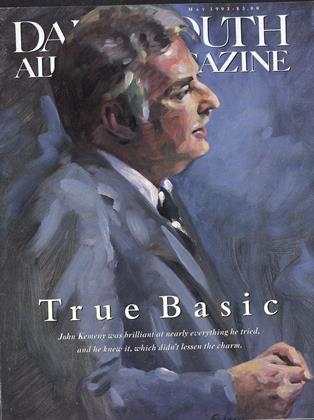TWENTY-five years after the death of Martin Luther King Jr., campus keynote speaker H. Carl McCall '58, president of the New York City Board of Education, was taking a Dickensian overview of the nation's continuing march through civil rights territory. He was at Dartmouth to commemorate Martin Luther King Day.
"It is the best of times, it is the worst of times," he said. The worst is indeed bad, as life expectancies for young black males in Harlem have sunk below those in Bangladesh; residents of the inner cities increasingly fear for the safety of their children; blacks who make it through high school or college significantly lag behind the earning power of whites, even though they marched in the same graduation line. Blacks also account for only five percent of graduate school enrollments. But, recounted McCall, there has also been great progress in the number of blacks graduating from high school, gaining Congressional seats, governing cities, occupying cabinet posts.
And, he cited progress at Dartmouth.
"I am heartened to look around this room and see so many people of color," said the man who was one of only-eight blacks in the class of 1958. He noted that his scholarship to Dartmouth had lifted him out of welfare. ("I didn't realize that the female-headed household I grew up in was a 'problem' until I took a sociology course," he said.) Ever since, he has helped others as a teacher, anti-poverty worker, New York State commissioner of human rights, ambassador to the U.N., New York state senator, Citibank vice president overseeing corporate involvement in the community, president of the nation's largest school board.
For all such progress, however, there is still far to go. "The issue of inclusiveness continues to confound us," he said. "Brothers and sisters," he told the crowd, "don't forget about your obligation to come back home and help the children."
Carl McCall
 View Full Issue
View Full Issue
More From This Issue
-
 Feature
FeatureAcross the River, Rising
May 1993 By Ed Gray '67, T '71 -
 Cover Story
Cover StoryTrue Basic
May 1993 By Nardi Reeder Campion -
 Feature
FeatureThe Man Who Took Over Dartmouth
May 1993 By John Scotford Jr. '38 -
 Article
ArticleWomen in Love
May 1993 By Katharine Gingrass-Conley -
 Article
ArticleA Postponed Power
May 1993 By James O. Freedman -
 Article
ArticleDr. Wheelock's Journal
May 1993 By E. Wheelock
Karen Endicott
-
 Feature
FeatureRooming with Style
NOVEMBER • 1987 By Karen Endicott -
 Article
ArticleReligion Professor Ronald Green:
December 1992 By Karen Endicott -
 Article
ArticleA Cautionary Tale
April 1995 By Karen Endicott -
 Feature
FeatureNative America at Dartmouth
APRIL 1997 By Karen Endicott -
 HISTORY
HISTORYA Matter of Degree
July/August 2001 By Karen Endicott -
 Article
ArticleWHAT HAPPENED TO THE DEMOCRATS?
APRIL 1989 By Robert Arseneau, Karen Endicott







